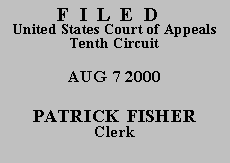

| VINCE LOPEZ, SR.,
v.
RONALD LYTLE, Warden, Southern
New Mexico Correctional Facility |
Nos. 99-2331 & 99-2367
(D.C. No. CIV-98-609-LH)
(D. N.M.)
|
Lopez raised his sufficiency of the evidence claim on direct appeal in the New Mexico Court of Appeals. That court determined the evidence presented was adequate to support the conviction. The New Mexico Supreme Court denied his petition for a writ of certiorari.
After exhausting his state court remedies, Lopez filed a petition for a writ of habeas corpus in the United States District Court for the District of New Mexico. Because Lopez filed his federal habeas petition after April 24, 1996, his petition is governed by the provisions of the Anti-Terrorism and Effective Death Penalty Act ("AEDPA"). See Hooks v. Ward, 184 F.3d 1206, 1213 (10th Cir. 1999). The district court, adopting the magistrate judge's recommendations, denied Lopez's petition on the ground that the circumstances surrounding the possession of stolen items were sufficient for a rational jury to conclude that Lopez knew the items were stolen. Although the district court did not act on the issue of a certificate of appealability ("COA"), COA is deemed denied pursuant to the General Order of October 1, 1996. See Tenth Circuit Emergency General Order issued October 1, 1996.
Lopez argues before this court that the State did not present sufficient evidence to prove he intentionally received, retained, or disposed of stolen property. The Due Process Clause of the Fourteenth Amendment requires that "no person shall be made to suffer the onus of a criminal conviction except upon sufficient proof -- defined as evidence necessary to convince a trier of fact beyond a reasonable doubt of the existence of every element of the offense." Jackson v. Virginia, 443 U.S. 307, 316, 99 S. Ct. 2781, 2787, 61 L. Ed. 2d 560 (1979). In a habeas corpus proceeding, we review a challenge to the sufficiency of the evidence to determine "whether after viewing the evidence in the light most favorable to the prosecution, any rational trier of fact could have found the essential elements of the crime beyond a reasonable doubt." Id. at 319, 99 S. Ct. at 2789, 61 L. Ed. 2d 560 (1979). Our review of the record indicates that sufficient evidence was presented at trial to suggest that Lopez knew the items were stolen. Testimony by his former girlfriend contradicted Lopez's claim that he was unaware that several items had been stolen by his son. Further testimony by a police officer challenged Lopez's allegation that he never possessed an item in question. Because we find that Lopez has failed to make a substantial showing of the denial of an important federal right, we DENY a COA and DISMISS the appeal.
ENTERED FOR THE COURT
David M. Ebel
Circuit Judge
*.After examining appellant's brief and the appellate record, this panel has determined unanimously that oral argument would not materially assist the determination of this appeal. See Fed. R. App. P. 34(a)(2) and 10th Cir. R. 34.1(G). The case is therefore ordered submitted without oral argument. This Order and Judgment is not binding precedent, except under the doctrines of law of the case, res judicata, and collateral estoppel. The court generally disfavors the citation of orders and judgments; nevertheless, an order and judgment may be cited under the terms and conditions of 10th Cir. R. 36.3.